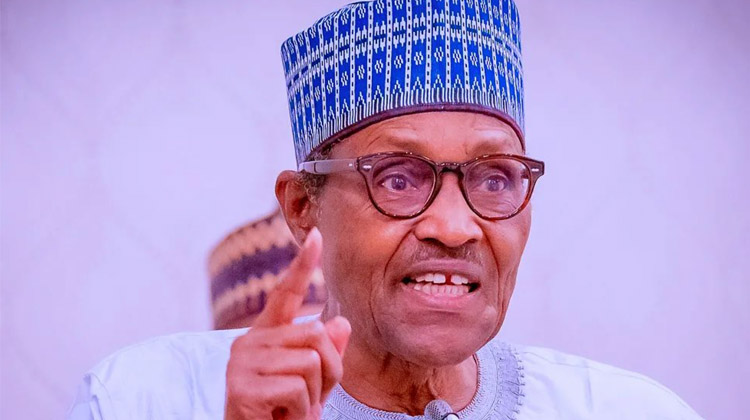Communication
Court Demands Explanation For $460M Chinese Loan On Failed CCTV Project

Last week, a Federal High Court in Abuja issued an order directing the government of President Muhammadu Buhari to provide a detailed account of the expenditure of a $460 million Chinese loan, which was intended to finance the unsuccessful Abuja Closed-Circuit Television (CCTV) project.
The court’s ruling further mandated the government to publicly disclose the complete sum of money disbursed to both Chinese and local companies and contractors involved in the project.
Additionally, the government was instructed to furnish specific information regarding the names of these companies and contractors, as well as the current status of the project’s implementation.
Hon. Justice Emeka Nwite delivered the order In a Freedom of Information suit numbered FHC/ABJ/CS/1447/2019 filed by Socio-Economic Rights and Accountability Project (SERAP).
The lawsuit was initiated in response to a statement made in 2019 by the Minister of Finance, Zainab Ahmed, regarding the loan servicing of Nigeria.
The Minister disclosed that the country was servicing the loan but expressed a lack of knowledge regarding the status of the CCTV project. She was quoted as saying, “We are servicing the loan. I have no information on the status of the CCTV project.”
In his judgment, Justice Nwite agreed with SERAP that “there is a reasonable cause of action against the government. Accounting for the spending of the $460 million Chinese loan is in the interest of the public. It will be inimical for the court to refuse SERAP’s application for judicial review of the government’s action.”
Justice Nwite also said that, “The Minister of Finance is in charge of the finance of the country and cannot by any stretch of imagination be oblivious of the amount of money paid to the contractors for the Abuja CCTV contract and the money meant for the construction of the headquarters of the Code of Conduct Bureau (CCB).”
Justice Nwite also ordered the government “to provide the details clarifying whether the sum of N1.5 billion Naira paid for the failed contract meant to construct the headquarters of the Code of Conduct Bureau (CCB) was part of another loan obtained from China.”
Justice Nwite’s judgment, read in part: “SERAP’s core objectives are to promote human rights, transparency and accountability and anticorruption in Nigeria.”
“I am of the humble view that there is a reasonable cause of action against the government [through the Minister of Finance] and I so hold that SERAP has made out a case to be entitled to the reliefs sought.”
“The law is well settled that where a document or letter is sent by post, it is the law that same is taken or presumed to have been delivered.”
“Following this principle of law and relying on exhibit OS2, SERAP’s Freedom of Information request sent to Ms Ahmed is deemed to have delivered. Therefore, the averment by the government [through her] that they were not served with the letter is hereby discountenance. I so hold.”
Joined as defendants in the suit are Ms Ahmed and the Minister of Police Affairs.
Justice Nwite granted the following orders of mandamus against the Nigerian government:
An order of Mandamus is hereby made directing and compelling the government [through the Minister of Finance] to provide and make available to SERAP information on the total amount of money paid to contractors, with specific details of names of companies local contractors involved, from the $460 million loan obtained in 2010 from China by the Federal Government of Nigeria to fund the failed Abuja CCTV contract.
An Order of Mandamus is hereby made directing and compelling the government [through the Minister of Finance] to provide the details of the local companies and Chinese contractors that have received funds from the $460 million loan for the finance of the Abuja CCTV contract as well as details of the status of implementation of the project.
An order of Mandamus is hereby made directing and compelling the government [through the Minister of Finance] to provide the details clarifying whether the sum of N1.5 billion Naira mobilisation fee reportedly paid to the contractors for the construction of the Headquarters of the Code of Conduct Bureau in Abuja was part of another loan from China. This is the judgment of the court.
SERAP deputy director Kolawole Oluwadare said: “The onus is now on President Buhari to immediately comply with the court’s orders. We commend Justice Nwite for his courage and wisdom, and urge President Buhari and Abubakar Malami, Attorney-General of the Federation and Minister of Justice to immediately obey the court orders.”
“This is a victory for justice, rule of law, transparency and accountability. The judgment shows the way forward in the fight against corruption and impunity of perpetrators. We will do everything within the law to ensure full compliance by President Buhari with this ground-breaking judgment on Chinese loans.”
“We call on President Buhari to use the judgment as the basis for publishing details of spending of all Chinese loans and other loans obtained by his government since May 2015.”
Nigeria’s total borrowing from China climbed from $1.39 billion to $4.29 billion between June 2015 and December 2022, according to data from Debt Management Office (DMO).
Nigeria’s 2023-2025 Medium Term Expenditure Framework (MTEF) and Fiscal Strategy Paper (FSP) revealed earlier in the year that the federal government will spend N6.31 trillion on debt servicing in 2023, which amounts to about 74.6% of the government’s projected revenue of 8.46 trillion for the year.
Nigeria risks losing key national assets to China in the event that it defaults in paying back loans obtained from China.
According to a report, Nigeria may have defaulted on Chinese loan repayment and stands the risk of paying a penalty amounting to N41.31 billion. The report quoted the Debt Management Office (DMO), which said Nigeria has failed to fully service its debt to China, which has accumulated to N110.31 billion in the last two years.
It would be recalled that SERAP had in December 2019 filed a lawsuit against Ms Ahmed over failure to “disclose information and specific documents on the total amount of money paid to contractors from the $460 million loan obtained in 2010 from China to fund the apparently failed Abuja CCTV project.”
The suit number, read in part: “Servicing Chinese loans for failed projects is double jeopardy for Nigerians—they can neither see nor benefit from the projects; yet, they are made to pay both the loans and the accrued interests.”
“The $460 million loan got for the failed Abuja CCTV project and the N1.5 billion for the construction of CCB headquarters, which may be part of another Chinese loan, may have been mismanaged or stolen, and in any case, remain unaccounted for.”
“Transparency in the spending of Chinese loans is good for everyone, as this would help to increase the effectiveness, legitimacy, and contribution of the loans to the development of public goods and services, and the general public interests.”
“The information being requested does not come within the purview of the types of information exempted from disclosure under the Act. The Respondent has no legally justifiable reason for refusing to provide SERAP with the information requested.”
“Democracy cannot flourish if governments operate in secrecy. The citizens are entitled to know how the commonwealth is being utilized, managed and administered in a democratic setting.”
Communication
NCC Greenlights New Tariff Structures For MTN, Airtel, Glo, Others
The Nigerian Communications Commission (NCC) has approved new tariff guidelines for telecommunications operators to enhance transparency, improve consumer understanding, and foster fair competition among its licensees.
The commission has also mandated that all telcos in the country limit the number of available tariff plans to a maximum of seven.
This information was disclosed in a document posted on the NCC’s website and signed by the Executive Vice-Chairman of the commission, Aminu Maida, on Saturday.
Read Also: NIN: MTN, Others Barred From Deactivating Lines
In addition, the number of bundles offered per operator has been reduced to 100, with the directive that no subscriber can be on more than one tariff plan at a time.
The NCC defines a tariff plan as a structured pricing scheme outlining the charges and conditions under which telecommunications services are provided to subscribers.
The document read in parts, “The number of tariff plans offered per operator is limited to seven, and the number of bundles offered per operator is limited to 100.
“There are no limitations to the number of add-ons a subscriber can opt into. However, each operator must have in place a mechanism that informs subscribers of the number of add-ons they have at the point of purchasing another add-on. Subscribers must be able to check (via USSD string, SMS) the number of add-ons purchased.”
It has been reported that the two leading telecommunications companies in the country are currently offering more tariff plans than allowed by the new directive.
MTN offers eight tariff plans, Etisalat has seven, Airtel provides ten plans, and Glo offers its customers four tariff plans.
In the “Guidance for the Simplification of Tariffs” document, the NCC stressed the importance of fully disclosing all tariff components and terms, requiring telecommunications companies to ensure that all marketing and promotional materials are easily understandable.
The NCC also underscored the necessity for operators to prioritize consumer education and transparency in all communications to enable subscribers to make well-informed decisions.
It said “Develop and submit detailed migration plans to transition subscribers smoothly to new tariff plans, without loss of service quality or benefits.
“All promotional elements must receive prior approval from the Commission and should be offered as standalone products with clear terms and validity periods.
“Submit comprehensive periodical reports detailing all active tariff plans, bundles, promotions, and Quality of Service (QoS) metrics. The guidance shall take effect on 29 July and will remain valid and binding on licensees until further reviewed by the commission.”
“Operators can choose to maintain only one bonus-led new subscriber acquisition plan. However, a new subscriber can only be retained on such a plan for a limited period of six months before being migrated to a standard tariff plan of their choice.
“Where a subscriber fails to migrate after being prompted in accordance with the applicable business rules, the subscriber will be reverted to the default tariff plan.
“Tariff elements of promotional activities/new acquisition plans referred to above will only be allowed under the following conditions: bonuses must comply with the commission’s price floor and price cap.
“In addition, actual depletion rates on bonuses must not exceed the price or fall below the price floor for voice services. The bonus allowances (voice/data/SMS) must be stated in naira terms and minutes/seconds for voice, GB/MB of data and number of SMS. Operators must fully disclose the above in their advertising materials.
The telecommunications regulator also stated that add-on subscriptions must be optional for subscribers.
According to the directive, “Subscribers should be able to purchase any add-ons of their choice while remaining on their existing tariff plan and/or bundle.”
The directive also specifies that a free add-on must be treated as a promotional offering and requires approval from the Commission in accordance with the 2023 guidelines on promotional advertisements.
Additionally, in line with existing regulatory instruments, service providers must obtain evidence of informed consent from subscribers before accepting an add-on.
The NCC noted that there are penalties for non-compliance with the guidance and that operators must adjust their offerings to comply within 90 days from the date of the directive issued on Saturday.
The commission noted “Transition plans for existing tariffs must be submitted on or before 12 August 2024. The Commission will review and respond to submissions within 10 working days.
“Tariff approval and modification applications must include comprehensive disclosure forms detailing all aspects of the tariff.
“Non-compliance will result in penalties, including fines, suspension of tariff approvals, or other regulatory actions as set out in the Act, related regulatory instruments and the subsisting Enforcement Process Regulation.”
The NCC has mandated that operators must notify subscribers of any changes to their tariff plans, including transitions to new plans, with at least 30 days’ notice. The commission emphasized that “notifications should be clear, outlining the reasons and benefits involved.”
In related news, operators have denied claims that the commission has approved a tariff increase. Gbenga Adebayo, Chairman of the Association of Licensed Telecom Operators in Nigeria, stated, “Telecommunications companies have not received any authorization for a tariff review.”
Additionally, inquiries made by our correspondent via calls and text messages confirmed that the rates remain unchanged.
Communication
Nigeria’s Telecom Market Eyes $11.43bn Value By 2029

In a significant market projection, Mordor Intelligence predicts that the Nigerian telecom sector is set to surge to a value of $11.43 billion by 2029.
The report anticipates a steady growth trajectory with a cumulative average growth rate (CAGR) of 4.70% between 2024 and 2029, based on the current market value of $9.09 billion.
The transformation of Nigeria’s telecom landscape, fueled by government initiatives to boost internet infrastructure and broadband connectivity, coupled with rising data consumption, 5G deployments, and innovative strategies from major telecom players, is expected to drive this substantial market expansion.
The report underscores additional factors propelling the growth of Nigeria’s telecom sector, emphasizing the surge in smartphone adoption.
the report said “Increased smartphone adoption in Nigeria has fueled the development of a dynamic digital services sector. Currently, millions of Nigerians use mobile apps, including social networking sites, e-commerce, and financial services.
“These apps could leverage smartphones’ capabilities to offer speed, convenience, and efficiency, encouraging more people to invest in smartphones.
“In addition to these expansions and collaborations, the growing adoption of digital technologies and government support in aiding the same alongside the 5G technology implementation across the country is analyzed to boost the demand for telecom towers significantly.”
“In addition to these expansions and collaborations, the growing adoption of digital technologies and government support in aiding the same alongside the 5G technology implementation across the country is analyzed to boost the demand for telecom towers significantly.”
Mordor Intelligence highlights that the flourishing e-commerce and digital service platforms in Nigeria are significant drivers behind the escalating demand for dependable telecom services in the country.
Communication
MTN Set To Partially Disconnect Glo Network

The Nigerian Communications Commission (NCC) has granted MTN’s request to partially disconnect Globacom (Glo) from its network owing to unsettled interconnect charges.
Reuben Muoka, the NCC’s Director of Public Affairs, disclosed this in a document named ‘Pre-Disconnection Notice’ on Monday.
The move follows Glo’s persistent failure to clear its outstanding debts despite multiple attempts to resolve the issue.
Under this partial disconnection, Globacom subscribers will solely receive calls from MTN users, while retaining access to other network services like outgoing calls to other networks and data services.
However, they won’t be able to initiate calls to MTN users during this period.
The statement read, “All subscribers are, therefore requested to take notice that the Commission has approved the Partial Disconnection of Globacom to MTN in accordance with Section 100 of the Nigerian Communications Act, 2003 and Paragraph 9 of the Guidelines on Procedure for Granting Approval to Disconnect Telecommunications Operators, 2012.
“At the expiration of 10 days from January 8, 2024, subscribers of Globacom will no longer be able to make calls to MTN but will be able to receive calls.
“The Partial Disconnection, however, will allow in-bound calls to the Globacom network,” it added






















